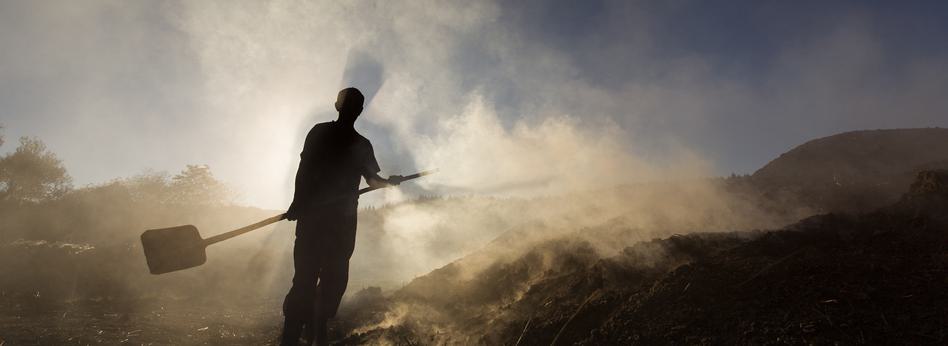Business and Human Rights Masters Course
2024 Curriculum Handbook
Welcome to 2024's Masters Course on Business and Human Rights. This webpage provides full details and reading lists for this year’s lectures. It also provides short biographies of the faculty. All times for lectures are CET.
Practical and administrative information on the course, including zoom links for the lectures, can be found online at https://mitt.uib.no (login required).
If you would like to connect with fellow students and lecturers, past and present, please request to join the BHR Masters Course LinkedIn page: https://www.linkedin.com/groups/8968379/.
Assessment
The assessment is a semester paper/academic essay assigned at the beginning of the semester. It is mandatory to submit a draft of the exam mid-semester, on which you will receive written feedback and comments. There are no specific requirements as to how developed that mandatory submitted draft has to be, but keep in mind that the value, quality, and scope of the feedback is dependent on the effort that you put into the draft.
The deadline for submitting the draft is: Friday 11th October at 14:00 (CET).
The draft is to be submitted on the course portal, MittUiB.
The final deadline for submitting your exam is: Monday 9th December at 14:00 (CET).
The final exam is to be submitted through the UiB exam portal, Inspera (see Mittuib for details).
Contacts
- Andrea Mevold Zakariassen (Course Coordinator, UiB) andrea.zakariassen@uib.no
- Salil Tripathi (Senior Advisor, Global Issues, IHRB) salil.tripathi@ihrb.org
- Therese Jebsen (Senior Advisor, Rafto Foundation) therese.jebsen@rafto.no
- UiB Videre (for administrative course-related questions) videre@uib.no
Feedback
We would be very grateful if you could provide feedback on the lectures/lecturers via this short survey: https://www.smartsurvey.co.uk/s/LIHXIY/.

Week 1: Thursday 12th-Sunday 15th September
Bergen, Norway
Week 1 Day 1: Thursday 12th September
1430-1630: Introduction - Therese Jebsen, Jostein Hole Kobbeltvedt, Andrea Mevold Zakariassen, Salil Tripathi, John Morrison
- Introduction to Rafto - Therese Jebsen, Jostein Hole Kobbeltvedt
- Introduction to the UIB - Andrea Zakariassen
- Introduction to IHRB - John Morrison
- Student Introductions
1630-1645 – Break
1645-1715: Course Outline – Salil Tripathi
1745: Meet at Rafto House, Menneskerettighetenes plass 1, 5007 Bergen
1800-1830: Conversation with Maryam Al-Khawaja
Conversation with Rafto Laureate.
1830: Pizza, drinks
Week 1 Day 2: Friday 13th September
1015-1115: Business and Human Rights: Introduction - Salil Tripathi
Why should business care for human rights? A historical perspective setting out the rationale for the course leading up to the protect-respect-remedy framework. What are the drivers of change? Why do things need to change? Companies respond to positive and negative incentives to change their behaviour. These include statements of ethics and values, consumer activism, shareholder activism, trade union activism, multi-stakeholder initiatives, regulatory changes, legislation.
Required reading:
- Universal Declaration of Human Rights, United Nations (1948)
- UN Guiding Principles on Business and Human Rights, John Ruggie, OHCHR (2011)
Additional reading::
- On the Margins of Profit: Rights at Risk in the Global Economy, Human Rights Watch (2008)
- The Arc of Human Rights Priorities. A New Model for Managing Risk, The Danish Institute for Human Rights (2011)
- Executive Summary: Human Rights: Is it any of your business? Amnesty International and the Prince of Wales International Business Leaders’ Forum (2000)
1145-1300: Expanding Web of Liabilities - Mark Taylor
Hundreds of human rights and environmental cases against corporations have been launched in countries around the world in the past two decades. This body of what might be called 'counter corporate litigation' involves legal actions seeking to hold business actors to account for alleged violations human rights and involvement in international crimes, or harms to the environment and biosphere. Sometimes these legal actions seek remedies for victims, sometimes they are a form of strategic litigation. Usually they are both.
In this lecture, I will focus on mapping this "expanding web of liabilities", in particular the main patterns of counter corporate litigation and identify the kinds of business activity that give rise to litigation. We will discuss what these patterns tell us about the priorities for business regulation and legal reform, including the integration of human rights and the environment into legal instruments governing corporate activities, transnational approaches to corporate accountability, and a willingness to challenge unsustainable business models.
Reading:
- The Inconvenient Truth About Business, Conflict, and International Crimes in Gaza Dr. Shahd Hammouri and Mark Taylor, IHRB Comment May 2024
- Obligations of Third States to Prevent and Punish Genocide in Gaza, Dr Irene Pietropaoli, Senior Fellow in Business and Human Rights, British Institute of International and Comparative Law (BIICL), 5 June 2024
- Commercial Crime in War, War Economies and International Law (Cambridge, 2021) Mark Taylor
Additional resources:
- Red Flags, www.redflags.info
- Dutch Court Orders Halt to export of F 35 Parts to Israel, February 24 2024, Reuters
- Risks and Considerations for Doing Business in the Russian Federation and Russia-Occupied Territories of Ukraine, US Department of State, February 23, 2024
- Lundin case in Swedish courts, including podcast on the case Pax for peace
- Strategic Litigation, Trial International
- 2024 Global Human Rights Ligitation Report,OSJI
- IBA War Crimes Committee Shines Light on Corporate Liability, International Bar Association
1300-1400: Lunch Break
1400-1515: Corporate Human Rights Due Diligence (HRDD): What are the Implications of Mandatory Measures? - Rae Lindsay
One of the key ways in which businesses can "know and show" that they respect human rights is by having in place human rights policies and due diligence processes aligned with the UN Guiding Principles on Business and Human Rights. Over the years, critics have said that business practice has moved too slowly, leading to calls for mandatory measures to require businesses to implement more meaningful HRDD. Recent years have seen an expanding web of new laws and regulations: first aimed at disclosure of steps being taken to counter abuses such as modern slavery, and more recently imposing mandatory requirements for due diligence and access to remedy that are clearly inspired by the UNGP.
The EU's Corporate Sustainability Due Diligence Directive, adopted in 2024, is the most wide-ranging and ambitious example to date. Will these legal measures be a positive force in improving business respect for human rights and holding them to account for adverse impacts across their value chains? Or will these laws prove to be little more than a driver for tick-box compliance, or worse still result in perverse outcomes that fail to improve the outlook for individuals and communities who are adversely affected by transnational business?
Reading:
- UN Human Rights "Issues Paper" on legislative proposals for mandatory human rights due diligence by companies (June 2020)
Optional:
1530-1645: Role and Responsibility of Directors - John Morrison
Why is it important for directors of companies to take human rights risks seriously? What are their legal liabilities? What are their fiduciary responsibilities?
Reading:
- Guidance Note: Board Duties in Ensuring Company Engagement with Affected Stakeholders, World Economic Forum (May 2022)
- Engaging Affected Stakeholders: The Emerging Duties of Board Members, World Economic Forum and IHRB (May 2022)
- How Businesses Can Step Up for Human Rights During this Global Crisis, John Morrison, IHRB (May 2022)
Week 1 Day 3: Saturday 14th September
1015-1130: Introduction to the Business and Human Rights Framework - Anita Ramasastry
International human rights law is normative. The frameworks that apply to business and human rights are drawn from UN declarations, conventions, protocols, and norms. The class will show the evolution in the UN system leading up to the negotiations for a binding treaty.
Required reading:
Additional suggested reading:
- Just Business: Multinational Corporations and Human Rights, John Ruggie (2013)
1145-1300: Companies’ Responsibility to Respect Human Rights – The Investor Perspective - Pia Rudolfsson Goyer
Investors are increasingly applying the UN Guiding Principles for Business and Human Rights in their investment work. This lecture will present why and how.
Required reading:
- Recommendation from the Council on Ethics from 2024: Recommendation Bollore (regjeringen.no)
1300-1400: Lunch Break
1400-1515: Implications of CS3D for Companies – Elise Edson
The EU’s Corporate Sustainability Directive (CS3D) marks a new era of corporate accountability, requiring in-scope companies to conduct comprehensive human rights due diligence on their own operations as well as those of their subsidiaries, and across their global “chains of activities”. Many companies subject to the CS3D must also navigate related or overlapping due diligence and reporting obligations under other EU laws, such as the Corporate Sustainability Reporting Directive (CSRD) or the pending Forced Labour Regulation. This lecture will focus on the Directive’s robust enforcement mechanisms, which include significant monetary penalties tied to a company’s global turnover—giving the Directive its real “teeth”. We will also analyse the Directive’s civil liability provisions, empowering victims to seek redress in EU courts, and consider how businesses can manage these legal risks while fulfilling their human rights obligations.
Reading TBC
1530-1645: Supply Chain and Due Diligence – Felicity Tapsell
The garment sector has a supply chain that is spread across the world and brands often have to deal with contexts and societies with varying standards and at different stages of development. Unexpected crises occur, such as social or political unrest, the pandemic, or coups. Drawing on Bestseller’s recent experiences in Bangladesh, Myanmar, and with Covid-19, the lecture will focus on how the company negotiates the challenges and dilemmas.
Reading:
- ETI sectoral assessment on Myanmar Myanmar enhanced due diligence sectoral assessment | Ethical Trading Initiative (ethicaltrade.org)
- EuroCham factsheet – provides a different but informative angle on the garment sector in Myanmar
- Company Approach: BESTSELLER Heightened Due Diligence report on Myanmar: Myanmar | BESTSELLER
- For further background, guidance from UNDP on HR due diligence in conflict affected regions is informative
- Relating to the recent political shifts in Bangladesh below recommendations from ETI highlight expectations towards companies: Bangladesh transition_MSI joint letter and reccommendations.pdf (ethicaltrade.org)
Week 1 Day 4: Sunday 15th September
1015-1130: Demystifying the Alphabet: UNGPs, SDGs, UNGC, ESG, CSR - Anita Ramasastry
A survey of the evolution of business and human rights framework from the Global Compact to the UN Guiding Principles for Business and Human Rights (the Protect-Respect-Remedy framework) the Sustainable Development Goals, and the negotiations for a binding treaty.
Reading:
- Corporate Social Responsibility Versus Business and Human Rights: Bridging the Gap Between Responsibility and Accountability, Anita Ramasastry, Journal of Human Rights, Vol. 14, No. 2, pp. 237-59 (2015)
Additional Resource:
- Beyond Voluntarism: Human Rights and the Developing International Legal Obligations of Companies, International Council for Human Rights Policy (2002)
1145-1300: Materiality, Salience and Human Rights Due Diligence - Vicky Bowman
The Corporate Sustainability Reporting Directive (CSRD) and associated European Sustainability Reporting Standards (ESRS) require an assessment of 'double materiality': impact materiality and financial materiality. Impact materiality pertains to 'the material information about the undertaking’s impacts on people or the environment related to a sustainability matter'. This now encompasses the UNGPs concept of 'salient' human rights risks, defined by the scale (how grave), scope (how widespread), irremediable character (how hard to make good) and likelihood of an adverse human rights impact.
What does all this mean for companies as they assess impact materiality in their supply chains and how to conduct both a salience analysis and an impact materiality analysis? This session will include a discussion on salient human rights and impact materiality concerning heavy rare earth elements (HREE) used in magnets in EV and wind turbine supply chains.
Reading:
- Fuelling the future, poisoning the present: Myanmar’s rare earth boom Global Witness (2024)
Additional Reading
- Salient Human Rights Issues, UNGP Reporting Framework
- Materiality and Salience, BSR
- EU Corporate Sustainability Reporting Directive (2022)
- SHIFT’s Guidance on the European Sustainability Reporting Standards (2023)
1300-1400: Lunch Break
1400-1515: Child Labour in Supply Chains (Case Study) – Salil Tripathi
The class will discuss the case of child labour use in supply chains. The lecture will also cover other instances, including Coca-Cola and sugar in Central America, garment industry in India, and sports goods manufacture in Pakistan.
Reading:
- Business school teaching case study: is private equity responsible for child labour violations? Financial Times
1530-1645: Due Diligence: Practitioner Perspective – Sidsela Nyebak
Drawing on several years’ experience at large Norwegian companies such as Telenor and Statkraft, the lecture will focus on practical implications of the new legislative developments and reporting requirements: what information is material, what is relevant, what is useful, what advances human rights, and what is a mere tick-boxing exercise.
Reading:
1700-1800: Academic Writing and the Exam – Andrea Zakariassen
This class will be a guide on how to approach the assignment.

Week 2: Friday 4th-Sunday 6th October
Virtual
Week 2 Day 1: Friday 4th October
1300-1415: Corruption, Business, and Human Rights: Morten Koch Andersen
Reading:
- The Limitations of a Human Rights Approach to Corruption, Cecily Rose
- Corruption as a Violation of International Human Rights, Anne Peters
- Anti-Corruption and Human Rights - How to Become Mutually Reinforcing? Raoul Wallenberg Institute, 2017
- Why Corruption Matters in Human Rights, Morten Koch Andersen, 2018
1430-1545: The China Question -Isabel Hilton
The rise of China has raised profound challenges for international politics, the global architecture, the climate crisis, and international human rights. China’s overseas investments through its Belt and Road Initiative pose significant challenges for human rights. China’s treatment of the Uyghur minority in the country’s west has received global condemnation and forced companies to rethink their supply chains. China’s crackdown in Hong Kong has had impacts on business and human rights, as has China’s support for Russia’s full-scale invasion of Ukraine, The class will examine these questions and explore what companies can and should do.
Reading:
- Xi’s National Security Agenda
- Reining in a Liberal UN
- Integrating Stability Maintenance Into Comprehensive Governance
Additional optional resources:
- China’s approach to Europe? Anti-diplomacy, Isabel Hilton, Prospect Magazine (2023)
- hongkongfp.com
- Future of human rights in Hong Kong (2024)
1545-1645: Break
1645-1800: Climate Finance – Rachel Kyte
What are the human rights implications of the climate crisis? What are the responsibilities for business? What is being done about it? Should business care about the Paris Accord and the COP summits? What does ‘Just Transitions’ mean? N.B. There are several readings for this class. Prof Kyte recommends skimming through; detailed reading is not essential.
Reading:
- A climate finance framework: decisive action to deliver on the Paris Agreement – Summary. Bhattacharya A, Songwe V, Soubeyran E and Stern N, LSE Grantham Institute (2023)
- Global Trends in Climate Change Litigation: 2024 Snapshot. Setzer J and Higham C, LSE Grantham Institute (2024)
- IMF Fiscal Monitor, Climate Crossroads. Fiscal Policies in a Warming World Chapter 1 (October 2023)
- UNOHCHR Policy Brief #5 Mobilizing Trillions for the Global South: The Imperative of Human Rights-based Climate Finance A Policy Brief from the UN Special Rapporteur on human rights and the environment
- And check out the Just Transition Finance Lab
1815-1930: Transition Minerals – John Morrison
Even with greater re-use and recycling, the global demand on Energy Transition Minerals (ETMs) will be immense in a world which is already competing for scarce resources. Commodities such as cobalt, lithium, copper, nickel, and manganese are not evenly distributed around the world, and China plays a dominant role in the refining and smelting of many metals. Sharp and unplanned increases in the demand for ETMs will bring new risks for communities adjacent to existing and new mine sites, including indigenous peoples, and greater risks for local conflict as well as the exploitation of artisanal miners.
Reading:
- Energy transition minerals and their intersection with land-connected peoples, John Owen, Deanna Kemp et al, Nature Sustainability (Dec 2022)
- Critical minerals review, International Energy Agency (2023)
- Critical Minerals and Green Transition, Environmental Justice Foundation (2023)
Optional reading:
- The Just Transition: A systems-thinking approach to managing climate action, Palgrave MacMillan (Springer) John Morrison, to be published in October 2024
Week 2 Day 2: Saturday 5th October
1300-1415: Just Transitions - Nick Robins
The climate crisis poses a significant challenge to human life. But steps taken to mitigate those risks also create human rights challenges, including loss of jobs and the need for retraining workforce. Governments and businesses have to undertake significant cost-benefit analyses to arrive at just solutions that seek to protect the planet while ensuring livelihoods. The lecture will look at the role finance can play and how human rights framework can inform policy-making. Participants are asked to identify a practical example from their own experience where the just transition imperative has come alive which can then be discussed in the session.
Reading:
- Climate Change and the Just Transition: A guide for investor Action LSE report with the Principles for Responsible Investment (PRI), the International Trade Union Confederation (ITUC), Harvard Kennedy School (2018)
- Making Transition Plans Just LSE guide on how to embed the just transition into financial sector net zero plans (2022)
- ILO/LSE Just Transition Finance Tool for bankers & investors, launched at COP27 (2022) LSE jointly with the International Labour Organization
- Just Finance India mobilizing private investment for the just transition, LSE with British International Investment, the Environment Management Centre (EMC) and Suranjali Tandon (2023)
1430-1545: Mandatory Human Rights Due Diligence in Germany and Europe: Claudia-Dominique Geiser
This lecture focuses on the latest regulatory developments on human rights due diligence in Germany and Europe. The German Supply Chain Act came into force in January 2023. With the law, several thousand companies have to appoint a human rights commissioner, analyse human rights and environmental risks in their supply chains and if found, take preventative and remedial action. The law served as the inspiration for the upcoming EU Corporate Sustainability Due Diligence Directive (CSDDD). The CSDDD introduces more elements to due diligence as well as a new civil liability norm, which will create access to justice for victims across the world. The lecture will give a brief overview of the two legislations, introduce key contents and discuss first implantation experiences from Germany.
Reading TBC
1545-1645: Break
1645-1800 Trade Unions and Business: Human Rights Implications – Owen Tudor
The session will – briefly – explore the following. Businesses are required by international and national legal instruments, and encouraged by voluntary initiatives as well as general morality and effective business practice, to meet a number of human rights obligations. Some of these relate to trade union rights (freedom of association, freedom to bargain collectively), employment rights (freedom from forced or child labour, freedom from discrimination, safe and healthy working environments and so on) and fundamental human rights such as freedom of expression, the right to family life etc. Unions can also help ensure that businesses meet their human rights obligations and develop good practice such as equal pay for work of equal value, healthy working practices, decent training opportunities and many more.
Reading:
- Global trade unions release baseline expectations for asset managers on fundamental labour rights, ITUC
- UN Business and Human Rights Treaty Negotiations, ITUC
- Ten years of workers’ rights under attack: 2023 ITUC Global Rights Index, , ITUC
1815-1930 Migrant Workers and Forced Labour in Supply Chains - Bonny Ling
In spite of laws abolishing forced labour and regulatory changes to protect migrant workers, many industries rely on temporary foreign workers who are vulnerable to labour abuses. They often work under high risks of debt bondage through a flawed system of recruitment and then face abusive living and working conditions, exploitation, withholding of wage, retention of personal identification, threats and intimidation and violence. The lecture will introduce the scale of the problem, the industries that are particularly vulnerable, the complexities posed by the pandemic, and raise questions about what can be done about the situation.
Reading:
- ILO indicators of Forced Labour, International Labour Organization (October 2012)
- Pages 29-42 The Role of Supply Chains in the Global Business of Forced Labour, Genevieve LeBaron, Journal of Supply Chain Management, no. 2 (2021)
- 4-min clip (made available by the Thessaloniki International Film Festival) of Buoyancy, written and directed by Rodd Rathjen; produced by Kristina Ceyton, Samantha Jennings, Rita Walsh (2019)
- Recognising forced labour risks in global supply chains: Sedex findings from 100,000 social audits, October 2021
Additional reading:
- Press Release: Deal on EU ban on products made with forced labour, European Parliament (2024)
- Such brutality’: tricked into slavery in the Thai fishing industry, Steve Dow, The Guardian (2019)
- pp. 1-8 Forced Labor in Supply Chains: Addressing Risks and Safeguarding Workers’ Freedoms, Fair Labor Association (2019)
Week 2 Day 3: Sunday 6th October
1300-1415: National Contact Points as Remedy - Frode Elgesem
The lecture will follow up on the importance of accountability and access to remedy for victims of business-related human rights impacts and examine the OECD National Contact Points as a non-judicial complaint mechanism and its effectiveness in offering remedy.
Required reading:
- UN Guiding Principles on Business and Human Rights, Pillar 3: Access to Remedy with commentaries
- pp 58 – 73, OECD Guidelines for Multinational Enterprises on Responsible Business Conduct, (2023 Edition) Part II with commentaries
- Confronting Challenges to Substantive Remedy for Victims: Opportunities for OECD National Contact Points under a Due Diligence Regime Involving Civil Liability, Karin Buhman, researchgate.net
Optional resources:
- State of Remedy 2023, OECD Watch
- Justice from Below: Struggles Against Corporate Misconduct in the National Contact Point System | Nordic Journal of Criminology, Elin Jönson, idunn.no
- OECD National Contact Points as Sites of Effective Remedy: New Expressions of the Role and Rule of Law within Market Globalization? Bhatt and Türkelli, Business and Human Rights Journal
- Access to Remedy in Cases of Business-related Human Rights Abuse: An Interpretive Guide, Office of the UN High Commissioner for Human Rights, 2024
1430-1545: Business and Human Rights – The Role of Human Rights Defenders – Andrew Anderson
Front Line Defenders' latest Global Analysis again highlights that "HRDs denouncing business-related human rights abuses continued to be subjected to numerous attacks, both online and offline, perpetrated by multiple actors, including State forces, company staff and company-linked individuals." Those working on human rights in the context of land rights, indigenous peoples' rights and environmental rights continue to be those at highest risk. Corruption continues to be the key driver of this violence. Strengthening the protection of human rights and human rights defenders requires better laws and more effective implementation. It also requires better engagement between businesses and human rights defenders. For many businesses this is also in their interests. In the UK 39 investors representing £3.9 trillion have expressed their support for a Business, Human Rights & Environment Act with liability provisions for companies failing to prevent harm.
Reading: As embedded
1545-1645: Break
1645-1800: Accountability: Ethical Trade and Sustainable Supply Chain: - Heidi Furustøl
Globaliistion has created complex supply chains where goods are manufactured in distant parts of the world and sold in distant consumer markets, with many intermediaries in between, including agents and brands. How practical is it for supply chains to reflect ethical behaviour and conform to international standards, and what powers do consumers have? This lecture will include an introduction to the new Norwegian Transparency Act.
Reading:
- Human Rights Due Diligence in Challenging Contexts together, Newly published by the joint Ethical Trading Initiatives
- English translation (to come) of Åpenhet om ansvar, Transparent about your responsibilities – by September the latest
- Report on environmental and human rights due diligence, to be published 28 Aug. English translation will be sent.
1815-1930: Human Rights Across Complex Supply Chains – Duncan Warner
Retail supply chains can be complex, nebulous and opaque. Reaching across the globe and spanning multiple tiers, from farms and fishing to manufacturing and logistics, having a robust approach in-line with the expectations set out in the United Nations Guiding Principles on Business and Human Rights (UNGPs) is vital. This lecture will look at the tools that can be used to protect rights’ holders and enable the prioritisation of an approach across a diverse portfolio of risks and impacts. It will include case studies and insights into how Human Rights can function within a large business and the challenges navigating multiple stakeholders, incidents and impacts can present, whilst enabling the business and its employees to understand risks and, where required, remediation.
Readings:
- Asda’s Standards for Suppliers
- Asda’s Human Rights Policy
- Overview of Asda’s work in this space – Creating Change for Better

Week 3: Friday 25th-Sunday 27th October
Virtual
Week 3 Day 1: Friday 25th October - Technology
1300-1415: Technology and Human Rights – Salil Tripathi and Lucy Purdon
Technology is meant to improve productivity, make our lives efficient and easier, reduce costs, increase leisure time and enable realisation of rights. No technology company explicitly says that its products intend to cause harm, but there are unintentional consequences as well as alternative applications developed which the original developers may not control. The class will highlight key concerns and set the stage for discussions to follow.
Reading:
Additional reading:
- The Power of Choosing Not to Build: Justice, Non-Deployment, and the Purpose of AI Optimization, Annette Zimmerman (2021)
- The Promise and Pitfalls of the Facebook Oversight Board, Harvard Business School (2021)
- Technology is Enabling Surveillance, Inequality During the Pandemic, Human Rights Watch
- We read the paper that forced Timnit Gebru out of Google. Here’s what it says, Timnit Gebru, MIT (2020)
- Smart cities: dreams capable of becoming nightmares, Amnesty International
1430-1545: Due Diligence in the Tech Sector - Meta/Facebook - Iain Levine
Human rights are increasingly both exercised and violated in the digital environment, so the challenge to promote and protect them in that space is critical for the movement - and the responsibility to respect them a huge challenge for tech companies. In this class we will look how Meta, with some 4 billion monthly users (across Facebook, Instagram and Whatsapp) seeks to respect its human rights commitments under the UNGPs. We’ll talk about the limits of free expression, human rights due diligence, protection of human rights defenders, the changing regulatory environment, crises and conflict, how the Oversight Board provides access to remedy and the role that the human rights team looks to play. Levine, a director on the human rights team at Meta, will lead the class.
Reading:
- Meta’s human rights policy
- Meta's annual human rights report (pp 13-33)
- AI's potential to advance human rights
1545-1645 Break
1645-1800: Due Diligence in Conflict-Affected Contexts – Tehtena Mebratu-Tsegaye
With global conflict on the rise, there is renewed attention on how companies manage human rights risks associated with operating in conflict-affected contexts. From Myanmar to Ukraine, political upheaval has pushed the business and human rights field to consider the implications of the law of armed conflict and crystallized clearer expectations on businesses operating in conflict-affected contexts.
But what does it mean, in practice, for a large company present across most of the world, to conduct enhanced human rights due diligence in higher risk contexts? This session will explore steps businesses can take to identify and mitigate conflict-related risks. Some key questions participants will consider include: How can a business understand the conflict environment and its role in it? If the risks are too high, what should companies consider when leaving a country or disengaging from specific business partners? How to engage with stakeholders in conflict contexts? This session will consider these questions primarily from the perspective of the ICT sector, but much of the material covered will be broadly applicable to other sectors.
Reading:
- Heightened Human Rights Due Diligence for Business in Conflict-Affected Contexts: A Guide | United Nations Development Programme (undp.org), pages 8-11
- Conflict sensitive human rights due diligence for ICT companies, BSR and Just Peace Labs
1815-1930: How Tech Companies Navigate Challenging Contexts - Vicky Bowman and Lucy Purdon
Technology companies—as providers of equipment, telecommunications services including access to the Internet—frequently face challenges from governments which ask the companies to reduce access, remove content, prohibit individuals, or provide government propaganda. Some of these actions have devastating consequences for human rights. The Internet’s use and misuse have caused or contributed to civic unrest including conflict. International standards suggest that any restriction should be proportionate, legitimate, time-bound, and necessary. Are companies able to resist? What rules apply to companies opeating in unstable or fragile environments? What rules of engagement exist? When is it time to leave? How can a company leave responsibly? What are the consequences of such actions? The faculty will draw on experiences from Egypt, Myanmar, and other conflict-prone or conflict-affected areas and analyse what happened and the class will evaluate the conduct.
Reading:
- Myanmar - Telenor Group
- Heightened Human Rights Due Diligence for Business in Conflict-Affected Contexts: A Guide, United Nations Development Programme (2022)
- Freedom of Expression and Privacy, Global Network Initiative
- https://www.fortifyrights.org/mya-inv-oped-2021-12-09/
Week 3 Day 2: Saturday 26th October – Conflict
1300-1415: Responsible Exit from a Fragile Zone – Mark Taylor with Salil Tripathi
Since the escalation of the Gaza conflict in October 2023, the responsibilities of companies doing business with Israel have come under increased scrutiny. Consumers, campaigners, investors, and other groups urge multinationals and investors to ensure they are not contributing to human rights abuse or fuelling the conflict. Indictments by the ICC of senior Israeli and Palestinian leaders for international crimes raises the spectre of companies who do business in Israel or Palestine being complicit in alleged crimes. At the same time, US-based companies face regulatory risks arising from laws which require companies to commit to not boycotting Israel. What does responsible business conduct look like in relation to the conflict in the Middle East? After an introductory lecture, the class will be divided into groups representing specific industry sectors and examine what it means for each business.
Introduction will be followed by interactive exercise in groups. No reading.
1430-1545: Operating in high-risk environments – Anton Mifsud-Bonnici
The purpose of the short class is to share mental frameworks based on real life experience. We will refer to the variety of issues that confront investors, regulators, consumers and other stakeholders when operating in risk intensive environments. We will discuss the basics of heightened due diligence to manage risk to rights-holders and to climate change imperatives, the early warning of weak governance, violent and organized crime, as well as corruption.
The class will touch upon the key concept of de-risking to reduce the cost of capital to enable the large FDI flows needed for the climate transition and for contributing to the cultivation of well governed human rights-friendly democratic environments.
Other issues will include whole/ complete value chain approaches to risk, as well as a discussion around key commodities, projects, conflicts etc. We visit experiences across geographies and sectors, and make links with international humanitarian and human rights law in conflict and war. The purpose is to equip class participants to raise practical due diligence questions, seek the truth and join the dots in whichever societal organ they are privileged to serve.
Reading:
- Green Peace: How the Fight Against Climate Change Can Overcome Geopolitical Discord, Foreign Affairs, June 2024
1645-1800: Spotlight on the UN Draft Treaty on Business and Human Rights – Anita Ramasastry
After the UNGPs were adopted unanimously in 2011, some countries held the firm view that there was the need for a binding treaty to regulate business activity. There have been divergent approaches about what the treaty should cover, the kind of companies it should regulate, and the sort of issues it should include. There are also questions about how deep the responsibility of companies run -- upstream as well as downstream. While governments, businesses, and civil society remain far apart in their wish list, this class will outline the major concerns and describe the process.
Reading:
- The Treaty Road Not Travelled, John Ruggie (2008)
- Levelling the Global Playing Field: A Treaty on Business and Human Rights, Paloma Munoz Quick (January 2024)
Resources:
- Information on the 10th session of the Open-Ended Intergovernmental Working Group on the Treaty, https://www.ohchr.org/en/hr-bodies/hrc/wg-trans-corp/session10
- Last draft distributed in January 2024, https://documents.un.org/doc/undoc/gen/g24/022/86/pdf/g2402286.pdf
1815-1930: Conflict and Humanitarian Law: Challenges for Business in High-Risk Areas – Claude Voillat
In an ideal world, businesses may wish to avoid operating in or being associated with conflict-affected regions or high risk areas, but they do not always have that luxury. One of the reasons pushing businesses to operate in conflict may for example be that they provide essential products and services to civilians (such as electricity, water, food, medicine, transport, etc.). When operating in conflict-affected regions, businesses run the double risk of triggering adverse impacts on the conflict dynamics as well as on the people and communities, either directly though their operations or indirectly through their products, services or relationships. The session will explore the particular context of conflict environments, the laws that businesses are expected to uphold, the legal protections they enjoy, etc. The lecture will be delivered by a veteran former official of the International Committee of the Red Cross (ICRC) who has worked closely with conflict for +30 years.
Reading:
- Business, human rights and conflict-affected regions: towards heightened action, UN Working Group - if you find this is too long, then you can read the Executive Summary.
Week 3 Day 3: Sunday 27th October – Discrimination
1300-1415: Cultural Rights and the Extractive Sector – Deanna Kemp
In May 2020, the mining company Rio Tinto destroyed rock shelters of considerable cultural and historic significance at Juukan Gorge, near the Brockman Iron Ore Mine, in Pilbara, Western Australia. Human rights and environmental groups protested; the community was outraged; investors revolted; the company apologized; and major personnel changes took place. The class will discuss the case.
Reading:
- Juukan Gorge inquiry puts Rio Tinto on notice, but without drastic reforms, it could happen again, The Conversation (2020)
- Rio Tinto’s statement on Juukan Gorge
Recommended reading:
1430-1545: Dalits and Discrimination – Beena Pallical
India has laws that outlaw untouchability and discrimination, yet discrimination persists. India has extended job quotas to historically underprivileged groups but only in the state sector, and discrimination persists in the state sector. How do human rights defenders campaign for change? Pallical, from the Rafto Laureate National Campaign on Dalit Human Rights, will speak of Dalit workers in supply chains and the campaign against inequality in India and beyond.
Reading:
- Caste in India: Their Mechanisms, Genesis and Development in “Writings and Speeches Vol. 1”, B R Ambedkar - It is a large volume; please read pages 3 to 22
- Cisco Caste Discrimination lawsuit in Silicon Valley, Anahita Mukherjee, The Wire
- Video: I am Dalit, How Are you?
- The Ambedkar Principles to Address Caste Discrimination in the Private Sector
- Base Code Guidance – Caste in Global Supply Chains, Ethical Trade Initiative
1545-1645: Break
1645-1800: LGBT Rights and Discrimination – Deryne Sim and Rei Kurohi
What role can business play to mitigate harm from discrimination against vulnerable groups such as LGBTI people? Deryne Sim from Same But Different in Singapore and Frank Mugisha of Sexual Minorities in Uganda will walk through the role of companies and what business can do. Salil Tripathi will introduce the UN standards of conduct for business with regard to LGBT rights.
Reading:
- Tackling Discrimination Against LGBTI People: Standards of Conduct for Business, United Nations. The report is long; recommended reading - the executive summary
- Strengthening the Economic Case, Open for Business (2022). This is a long report – please see executive summary – pages 4-5 and the Global Situation (up to page 19), and familiarise yourself with the key issues and drivers.
- The 27 Propositions, Open for Business
- Channels of Influence, Open for Business
- Opening Up The World: How Multinational Organizations Can Ascend The Maturity Curve On LGBT+ Rights, David Glasgow and Kenji Yoshino
- 2021 Universal Periodic Review Report, Pink Dot SG and Oogachaga. This reading is intended to give you an overview about the situation in Singapore. Reading the comics will be sufficient.
Additional reading:
- The Economic Case for LGBT+ Inclusion in Central and Eastern Europe (CEE), Open for Business
- The Economic Case for LGBT+ Inclusion in the Caribbean, Open for Business
- Impact report 2021-2022, Open for Business
1815-1930: Race and Discrimination – Dominique Day
In this class, Dominique will take us through the history of race and business, with specific focus on the reliance on people of African descent in the development of the modern global economy. We will look at the roots of some of business norms and practices and examine their fidelity to human rights norms, and also investigate how business practices evolved in part based on the ability to disregard the human rights or the humanity of some. Finally, we will examine how this may drive business priorities and understandings today.
The tension between symbolic change and substantive change in commitments to anti-racism has emerged. Corporate practices are squarely in the public eye in this regard. While symbolic change that may have seemed impossible years ago is occurring, the public demand for substantive change to address institutional racism - including in corporate institutions that heavily infleunece daily life - has been evident. Sometimes this is because these corporations (like sports franchises) rely on Black lives to thrive. In this class, we will discuss as a group various corporate responses to a demand for commitments to anti-racism.
Reading:
- Toward a Vision for Racial Equity, Inclusion at Starbucks: Review and Recommendations, Heather C. McGhee and Sherrilyn Ifill (July 2018)
- 1619 Project: Sugar, Khalil Gibran Mohammed, The New York Times (August, 2019)

Week 4: Friday 22nd-Sunday 24th November
Bergen, Norway
Week 4 Day 1: Friday 22nd November – Extractive sector
1000-1115: Extractive Industries and Human Rights – Nnimmo Bassey
Oil was discovered in the Niger Delta in the 1950s, and companies have extracted oil in the region since then. Oil revenues generated have been in billions of dollars annually, but much of the Niger Delta remains poor. The landscape is polluted, with constant flaring of gas, and the pipeline infrastructure is aging, with many instances of leakage. Some of it is due to disrepair, and some of it is through what oil companies and government claim to be sabotage. Oil theft is a major issue and those involved are suspected to include those that ought to protect the facilities. In efforts to protect the infrastructure and installations as well as company personnel, companies have relied on state and private security forces, which have been accused of human rights abuses. Instead of making the region, and the country, prosperous, oil has brought misery to the Niger Delta. Today, the major oil companies are divesting from onshore fields and are moving into deep offshore or are entirely quitting the country without taking responsibility for the harms they have caused over the decades. The class will focus on what has gone wrong, what the responsibilities of companies are, and what can be done to remediate the situation.
Optional reading:
- Bassey, Nnimmo: We thought it was oil, but it was blood: Resistance to the Military Corporate Wedlock in Nigeria and Beyond - Nnimmo Bassey, Transnational Institute, HOMEF
- Befouled and Begrimed
- Exploited, Dispossessed and Abandoned
- Wengraf, Lee: Extracting Profit
- Bassey, Nnimmo: To Cook a Continent
- Galeano, Eduardo: The Open Veins of Latin America
1130-1245: Corporate Due Diligence in the Extractive Sector – Froydis Cameron-Johansson
In a world where the supply of critical metals and minerals are key to the low carbon energy transition, how does responsible business navigate the human rights landscape from early-stage exploration in remote areas, to project development (often with joint venture partners, usually governments) through the logistics and supply chains and on to closure or divestment?
Using real examples, we will step through the key challenges and considerations a responsible company would go through to practically apply the UNGPs and VPSHR.
Reading TBC
1245-1345: Lunch
1345-1500: Shipping and human rights – Francesca Fairbairn
Description:
When we think of supply chains we tend to think of mines or farms, smelters or manufacturing plants, construction workers or factories, possibly fulfilment warehouses or retail stores, cars or phones. But between every stage of processing, stuff is transported, sometimes multiple times and mostly by ship. 90% of world trade travels by sea. Raw materials may end up make many journeys by ship before they reach their end consumer. And all of this is managed and delivered by the world's merchant navy: 1.8 million seafarers on 60,000 vessels. Who is responsible for their welfare?
Reading:
- Flags of Convenience, Mark Pieth & Kathrin Betz, 2024 pp37-40 and pp80-91 - also look at the contents page
- The ‘dark fleet’ of tankers shipping Russian oil in the shadows, Guardian August 2023
- A guide to mass balance vs traceability, ASI (requested during John Morrison's lecture - partic pp7-8)
1515-1630: Norwegian Extractive Sector and Due Diligence: A conversation with Marte Johnsen Stensrud and Nina Schefte (Moderator: Salil Tripathi)
The Norwegian extractive sector has made significant pledges to work towards sustainability. Norway also has an exemplary programme to channel oil revenues towards public good through the investments of its sovereign wealth fund. Marte Stensrud has led work on social responsibility at Equinor, and Nina Schefte, at Hydro, two large Norwegian companies in the extractive sector. In this conversation they will share dilemmas, experiences, challenges, and solutions the companies have developed, through examining corporate conduct, stakeholder engagement, and sustainability principles.
Reading:
- Hydro Annual Report 2023 Page 118-121, Page 141-150
1800-2100: Farewell dinner at restaurant tbc. Guest of honour: Rafto Laureate Dr Frank Mugisha
Week 4 Day 2: Saturday 23rd November
1000-1115: Corporate Accountability for Human Rights Abuses – Erika George
Recent rulings by the Supreme Court of the United States have provided greater rights protections to private corporate actors while placing significant restraints on access to remedy for alleged victims of human rights violations involving corporations. Accountability before courts in countries where business enterprises are headquartered remains elusive with some notable exceptions in certain jurisdictions that have already enacted some form of human rights reporting or due diligence regulatory measures. Appreciating the challenges associated with bringing and winning lawsuits in many jurisdictions around the world, this course will provide an overview of “what is being done” and “what is to be done” sharing insights from George’s recent book Incorporating Rights: Strategies to Advance Corporate Accountability assesses different strategies to advance corporate accountability.
Questions for Consideration:
- How do courts treat claims involving corporations alleged to have caused or contributed to human rights abuses? How are courts treating claims involving new rights and risks associated with environmental damage and climate change? How are out-of-court alternatives being used by human rights advocates to demand changes in company policies and practices that impact the enjoyment of human rights?
Reading:
- Climate Litigation: Assessing Potential Impacts Remains Complex, Thomas Englerth, Bruno Bastit, Paul O'Donnell (May 7, 2024)
Additional reading:
- Evaluating Impacts of Strategic corporate Accountability and Human Rights Litigation (June 2023)
- Unjust transition on trial: Communities and workers litigate to shape corporate practice (July 2024)
1130-1245: Human Rights Challenges for the Oil & Gas Sector - Carine Coudeville
The energy sector like other business sectors has embraced the business & human rights journey prompted by the UN Guiding Principles and the OECD Guidelines for Multinational Enterprises. Human rights, together with sustainability, have made their way into corporate agendas more broadly from that time. More recently, in the context where demand in energy and climate consciousness are growing side by side, the energy sector had to reinvent itself fast, navigating between these two opposite drivers. A majority of energy business actors have announced a net zero ambition by 2050 and a series of actions have been initiated from diversifying their energy offer to phasing down traditional fossil fuel related businesses. Transitioning away from fossil fuels to transitioning into more decarbonised energy sources goes with the necessity to keep the respect of human rights at the core of such transition strategy.
Since 2021, TotalEnergies reorganised itself drastically to support its transition strategy. Its ongoing transition journey raises a number of challenges regarding human rights whilst enabling to implement good practices at the same time. The lesson will cover the subjects of just transition, responsible exit and critical minerals used in the solar business, with concrete examples from TotalEnergies’ existing operations or new projects in Africa (notably Mozambique, Uganda, Congo) and the Middle East (Iraq and Oman).
Reading:
- TotalEnergies’ Human Rights Briefing Paper 2018-2023
- TotalEnergies’ Sustainability & Climate Progress Report 2024
1245-1345: Lunch
1345-1500: Bhopal and Impunity – Usha Ramanathan
In December 1984, an explosion in one of the tanks at a Union Carbide plant in Bhopal, India, led to toxic gases including methyl isocynate escaping into the air, instantly killing 2,800 people. Over the years, over 20,000 people died of causes related to the disaster, and over 5,00,000 persons were affected in the disaster. In 1989, The Supreme Court of India endorsed a settlement between the Indian government and the multinational, done without consulting with the victims of the disaster.
In 2001, the Union Carbide Corporation was bought by Dow Chemicals, which acquired all assets except the company in India, which was sold separately to an Indian state-owned company.
This year marks the 40th anniversary of the disaster, and many victims and survivors are still campaigning for justice.The lecture will outline the case and examine why there has not been an effective remedy and explore what can be done about it.
Reading:
- The Bhopal disaster and its aftermath: a review, Broughton, National Library of Medicine (2005)
- The long, dark shadow of Bhopal: still waiting for justice, four decades on, Tim Edwards, Guardian (June 2023)
Optional reading:
- Union Carbide Corporation vs Union Of India Etc on 4 May, 1989, Supreme Court of India
- F.B. Taraporawala And Others Etc.Etc vs Bayer India Ltd. And Others on 9 September, 1996, Supreme Court of India
1515-1630: Business, Gender, and Discrimination – Harpreet Kaur
This class will examine gender-based discrimination and the role of companies to prevent discrimination, harassment, and bullying, and ensuring equality for workers, consumers, and the society. The class will also introduce the gender guidance on the UNGPs from the UN Working Group.
Reading:
- Gender guidance for the Guiding Principles on Business and Human Rights, OHCHR
- Gender-based framework on business and human rights, Surya Deva (2019)
- Women in Business and Human Rights: A Mapping of topics for state attention in UNGPs
Additional reading:
- Making women workers count, BSR (2019)
Week 4 Day 3: Sunday 24th November
1000-1115: Human Rights, Corporate Responsibility, and Artificial Intelligence – Erika George
Algorithms and artificial intelligence (AI) are a growing source of power globally. AI touches different aspects of our lives daily. The disruptive advancements in AI have made it clearer than ever before that the hardest and most urgent problems to solve in technology are at the human frontier and will require ethical expertise and responsible leaders in business and technology to ensure a viable future for humanity. Will generative AI replace actors and creative writers? How should the future of work be conceived and what protections should be in place for workers that are training AI models? Do algorithms discriminate and undermine equity? Is algorithmic bias avoidable or inevitable? Do predictive models violate privacy or protect security? Will algorithms undermine democracy or enable participation? This course will: (1) provide an overview of the ways artificial intelligence (AI) is defined, developed, and deployed; (2) present examples of ways AI can impact a range of human rights; and (3) provide a comparative overview of various efforts to regulate AI in ways that protect human rights and promote the development of new technologies.
Questions for Consideration:
- How could AI technology influence the enjoyment of human rights? How should regulators balance promoting innovation and protecting individual liberties?
Reading:
Summary Note: AI, Human Rights, and the Evolving Regulatory Environment, B-Tech, UNHCHR, GNI (Oct. 2023)
Additional reading:
1130-1245: Stakeholder-Driven Business Models: Moving Beyond Shareholder-Centric Approaches – Harpreet Kaur
This session explores the transition from shareholder-centric to stakeholder-driven business models, emphasising governance structures that balance stakeholder interests. Participants will examine frameworks and metrics for social and environmental impact alongside financial performance. Through case studies, we’ll identify successful stakeholder engagement strategies, analyzing how these foster resilience and long-term value. Key discussions will revolve around principles of stakeholder capitalism, governance, and sustainable impact measurement.
Reading:
- Stakeholder: How Ed Freeman’s vision for responsible business moved from theory to reality. M McCance, Darden Report Online, 2024
- The stakeholder model and ESG. Kay, I., Brindisi, C., & Martin, B., Harvard Law School Forum on Corporate Governance, 2020.
- Corporate power over human rights: An analytical framework, Birchall, D., Business and Human Rights Journal, 6(1), 42-66 (2021).
- The stakeholder model of corporate governance. Farnham, K., Diligent Insights (2024)
- BRT Statement on the Purpose of a Corporation
The following readings might be helpful if you can get access:
- Dowell-Jones, M. (2017). Embedding Human Rights in Business Practice: The Role of Stakeholder Engagement. Business and Human Rights Journal, 2(1), 47-69.
- Deva, S. (2018). The UN Guiding Principles’ orbit and other regulatory regimes in the business and human rights universe: Managing the interface. Business and Human Rights Journal, 3(2), 203-225.
- Baumann-Pauly, D., & Nolan, J. (2018). Corporate Human Rights Benchmarking and Its Impact on Stakeholder Engagement. Business and Human Rights Journal, 3(2), 257-280.
- Birchall, D. (2021). Corporate power over human rights: An analytical framework. Business and Human Rights Journal, 6(1), 42-66.
1245-1345: Lunch
1345-1500: Business and Human Rights – Future Challenges. Panel discussion with Nnimmo Bassey, Frank Mugisha, and Usha Ramanathan. Moderator: Salil Tripathi
Description TBC
1515-1630: “Last Lecture” – Salil Tripathi
As we end the course, some questions for the future. What is the purpose of a company? What should it do? Who does it benefit? Who does it serve? What should individuals working for companies do? What should drive their conduct?
Not required reading but worth reflection:
- Friedman’s essay in 1970
- Essays on Friedman at 50
- 50 Years of Friedman - symposium
- The Shareholder Value Myth, Cornell Law Library
- Video on ‘purpose’ and profit
- Essay on The Purpose from the Nation
Meet the Faculty

Nnimmo Bassey
Director, Health of Mother Earth Foundation (HOMEF)

Rachel Kyte
UK Special Representative for Climate

Usha Ramanathan
Human Rights Scholar




































